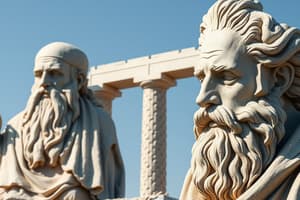Podcast
Questions and Answers
Which branch of philosophy studies the nature of reality?
Which branch of philosophy studies the nature of reality?
- Aesthetics
- Ethics
- Epistemology
- Metaphysics (correct)
Socrates is one of the predecessors of the Big Three philosophers.
Socrates is one of the predecessors of the Big Three philosophers.
False (B)
What method of philosophizing uses cooperative dialogue to stimulate critical thinking?
What method of philosophizing uses cooperative dialogue to stimulate critical thinking?
Socratic Method
____ introduced the idea that everything flows and that change is central to the universe.
____ introduced the idea that everything flows and that change is central to the universe.
Match the following philosophers with their contributions:
Match the following philosophers with their contributions:
What is the primary focus of analytic philosophy?
What is the primary focus of analytic philosophy?
Phenomenology studies the structures of consciousness and experience.
Phenomenology studies the structures of consciousness and experience.
Name the three Big Philosophers.
Name the three Big Philosophers.
Flashcards are hidden until you start studying
Study Notes
Introduction to Philosophy
- Definition: Philosophy is a discipline that explores fundamental questions about existence, knowledge, values, reason, mind, and language.
- Branches: Key branches include metaphysics (nature of reality), epistemology (study of knowledge), ethics (moral philosophy), logic (principles of valid reasoning), and aesthetics (study of beauty).
Having Philosophy
- Personal Philosophy: Refers to an individual's beliefs and values that guide their behavior and decision-making.
- Critical Thinking: Philosophy encourages questioning assumptions, promoting rational analysis and reflection.
- Practical Application: A philosophy can influence one's approach to life, relationships, work, and societal issues, aiding in personal development and ethical living.
Predecessors of the Big Three
- Big Three Philosophers: Socrates, Plato, and Aristotle.
- Predecessors:
- Thales: Proposed natural explanations for phenomena, considered the first philosopher.
- Heraclitus: Introduced the idea of change being central to the universe (“everything flows”).
- Parmenides: Argued for the concept of being and the idea that change is an illusion.
- Democritus: Developed early atomic theory, emphasizing the existence of indivisible particles.
Methods of Philosophizing
- Socratic Method: A form of cooperative argumentative dialogue that stimulates critical thinking through questioning.
- Analytic Philosophy: Focuses on clarity and argumentation, often using formal logic.
- Continental Philosophy: Emphasizes subjective experience and the historical context of philosophical questions.
- Comparative Philosophy: Examines philosophical concepts across different cultures and traditions.
- Phenomenology: Studies structures of consciousness and experience, focusing on how things present themselves.
- Existential Inquiry: Explores themes of existence, freedom, and the meaning of life.
These notes provide a concise overview of the main elements in the study of philosophy, encompassing its definition, personal significance, historical context, and methodologies.
Introduction to Philosophy
- Philosophy investigates fundamental questions regarding existence, knowledge, values, reason, mind, and language.
- Major branches include:
- Metaphysics: Examines the nature of reality.
- Epistemology: Focuses on the study of knowledge and beliefs.
- Ethics: Concerned with moral philosophy and concepts of right and wrong.
- Logic: Involves principles of valid reasoning.
- Aesthetics: Studies concepts of beauty and artistic value.
Having Philosophy
- Personal philosophy encompasses an individual's beliefs and values, influencing behavior and decision-making.
- Encourages critical thinking by challenging assumptions and fostering rational reflection.
- Serves practical applications in daily life, relationships, work, and societal issues, promoting personal growth and ethical living.
Predecessors of the Big Three
- The three major philosophers, Socrates, Plato, and Aristotle, were influenced by earlier thinkers.
- Thales: Regarded as the first philosopher for offering natural explanations for phenomena.
- Heraclitus: Emphasized change as a fundamental aspect of the universe, famously stating “everything flows.”
- Parmenides: Proposed that change is an illusion and focused on the concept of being.
- Democritus: Introduced early atomic theory, suggesting that the universe is composed of indivisible particles.
Methods of Philosophizing
- Socratic Method: Engages individuals in dialogue to stimulate critical thinking through questioning.
- Analytic Philosophy: Prioritizes logical clarity and structured argumentation.
- Continental Philosophy: Focuses on subjective experiences and the historical context impacting philosophical inquiry.
- Comparative Philosophy: Explores philosophical concepts across various cultures and traditions for a broader understanding.
- Phenomenology: Investigates structures of consciousness and experience, emphasizing how phenomena present themselves.
- Existential Inquiry: Delves into themes of existence, freedom, and life’s meaning, seeking deeper understanding of individual human experiences.
Studying That Suits You
Use AI to generate personalized quizzes and flashcards to suit your learning preferences.




